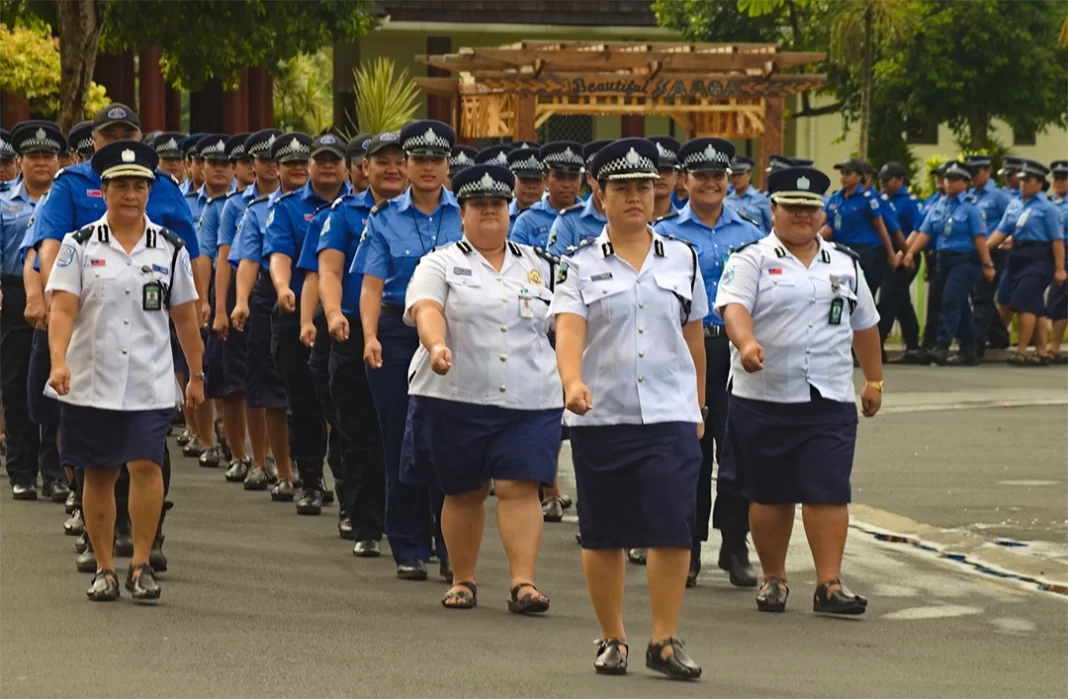Youth unemployment and illegal drugs have been named by Police Commissioner Auapaau Logoitino Filipo as the major causes of theft and burglary currently being experienced by the community in recent months.
He said these were the two factors identified by his Ministry as reason for the increase of burglary and theft around Samoa.
“I confirm there is an increase of burglary and theft in the country at the moment and like I have said before there are particular reasons.”
According to Auapaau these include the growing problem of unemployment and illegal drug use and sale.
He said the Samoa Police has managed to find connections between the burglaries and thefts and illegal drugs from the raids they have so far executed.
Many of the electronic equipment found in many of the sights reported by the community where illegal drugs are being sold and raided by Police have been established stolen.
These stolen equipment he said are part of the ongoing items reported from many of the burglary and theft cases already with Police.
“Youth unemployment is a growing problem and is another major cause of burglary and theft,” said the Commissioner.
“The Samoa Police is currently being restructured to look at an approach to address this growing issue and has already laid down its strategies to counter the increase of this crime.”
But said many of the offenders are from Faleata and Vaimauga clarifying that they are not originally from there.
Rather they are people who relocated to these urban villages from rural areas and Savaii, to seek job opportunities, and improve their financial situations.
Instead of finding jobs these people are engaging in illegal activity to earn money for a living.
“The Police has also established that some of the offenders are ostracised from their villages in Savaii.”
Increase Penalty
When questioned by an NUS reporter whether the Ministry feels that the penalties for these crimes should be increased he said this is not their jurisdiction.
But the Samoa Police views the penalties for these offences as appropriate.
In regards to decisions by the court there are factors looked at by the judge which reduces jail time for offenders.
These include being a first offender and sentencing include less time in prison, and this is giving them a second chance to carry out punishment under rehabilitation programs by the Samoa Victim Support Group and the Salvation Army.
These programs are recommended by the courts to help the offender/s mend their behaviour for the future said Auapaau.
Illegal Drugs
The Police has yet to find any solid evidence that illegal drugs are being produced in Samoa.
What they can establish and confirm is that illegal drugs are being shipped from elsewhere and then into Samoa from across the border.
And this is something that the Samoa Police is currently collaborating with other Ministries and border agencies to tackle and address in order to reduce or close off any opportunities of this further happening.
The most common illegal drug found in Samoa at the moment is Crystal Methamphetamine (Meth) referred to as ‘ice’ says Auapaau.
So far there have been many people already affected by the impacts of either taking the drug or selling it.
What the Samoa Police has also identified is that runners commissioned by dealers are using younger people including street vendors and those in schools.
“Two weeks ago in a raid to the Savalalo market, street vendors were found to be selling soft drinks and at the same time selling drugs.”
These are vulnerable people and drug providers are well aware of this, so they hire them to run and deal drugs and in return they get paid money for it.
But, despite the increase in meth found in Samoa in raids, Auapaau also claimed that marijuana is no different, as their raids continue to confiscate large amounts.
The problem he said is that Samoa isn’t the only country affected already by Meth, ‘it is all over the Pacific’.
To counter the problem of drug use in schools, the Community Engagement Unit of the Samoa Police continues to visit schools across the country.
And also responding to church requests for programs for awareness of the dangers of the use of illegal drugs.
“And the end affect is not good,” says the Commissioner.
The Ministry continues to drive its work forward with the resources available including advice to schools and awareness to the general public with the main aim that it will help reduce the problem.

Author: Jasmine Netzler-Iose





